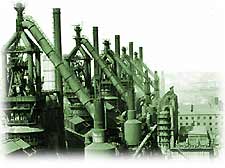The Linz Economy under National Socialism
Kurt Tweraser

The author provides a general survey of the economic development in Linz and Upper Austria during the NS-regime. His analysis of the far-reaching changes deals with the elimination of mass unemployment; the short period of a peace economy already oriented towards war production (1938-1939), especially the founding of big industrial concerns (the Goering Iron and Steel works and the Nitrogen works); the basic problems created by the ensuing period of a wartime economy with significant peacetime features (1939-1941); and, finally, the period of total war (1942-1945).
In Linz as elsewhere in Austria, the worldwide economic crisis, coupled with the shortsighted political and economic forces of inertia led to a profound crisis of transformation, culminating in a semi-fascist “Staendestaat.” An ever-larger growing segment of the Austrian population expected the solution of the crisis from National Socialism since the unlucky and unloved “Staendestaat” was obviously unable to do the job. After the “Anschluss”, Austria was immediately incorporated into the Four Year Plan.
From the beginning, armament dominated the “Ostmark” economy. By 1940, disillusionment set in among small business owners, since the NS-regime did not give the expected priority to the longstanding protectionist demands of the “old Mittelstand” where they conflicted with the interests of big business. The defeats of the German army at Moscow and Stalingrad led to further measures inimical to small business, such as forced closing or “combing out” of shops, increased drafting into the armed forces and conscription into war industries, and the flood of foreign workers.
The consequence of the predominance of armament and heavy industry for Linz and Upper Austria was a structural change in the economy, whose “winners” were the capital-intensive industries at the cost of small and middle-sized businesses not essential for the war effort.
The author also deals with the denazification of the Linz and Upper Austrian economy. The cleaning of the economy was hindered by the generally-held assumption that an all-too-rigorous denazification would rob the country of the larger part of its economic elites and thereby adversely affect economic reconstruction. Thus, the temporary partial reduction in status of National Socialists was soon followed by a period of re-integration in which the stark pragmatism of the Austrian political parties, interest groups and the Catholic Church, in a veritable outburst of “mercy lobbying”, resulted in the return of the now “ex-National Socialists”.